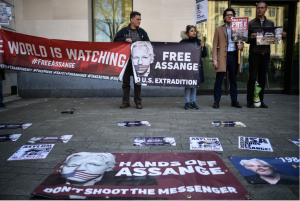Assange: A Self-Proclaimed Foe of Secrecy Who Inspires Both Admiration and Fury
< < Go Back
The shaky video clips of Julian Assange’s arrest flashed around the world on Thursday, the white-bearded prophet of the age of leaks being hauled by unsmiling security officers to a gray van marked Police.
“We must resist!” he cried. “You can resist!” It was a scene that the very image-conscious Mr. Assange might appreciate: one man literally fighting the all-powerful state.
It was also the latest — and surely not the last — dramatic turn in a career marked by both brilliant achievement and dubious judgment. Mr. Assange has long had a knack for celebrity, and as a tech-savvy, global, almost stateless figure, he captured the new influence the internet could give to individual citizens.
His creation of WikiLeaks helped empower a generation of whistle-blowers and disgruntled insiders who could operate on an industrial scale, providing disclosures by the terabyte and enraging the powerful in many countries. WikiLeaks collaborated closely with major world publications, including The New York Times, in the release of secret records on the American-led wars in Afghanistan and Iraq and a quarter-million confidential State Department cables.
But Mr. Assange has always elicited fervent reactions: He has been hailed as a hero of free information, or despised as a treacherous criminal worthy of death by drone — often depending on what WikiLeaks had recently been up to. Though he has always described himself as a journalist, he has been far too much of an activist to be satisfied with the role of neutral and fair-minded provider of information.
He has proved a highly problematic, even embarrassing champion for the principles of press freedom and the public’s right to information, especially in recent years.
More From The New York Times (subscription required):




